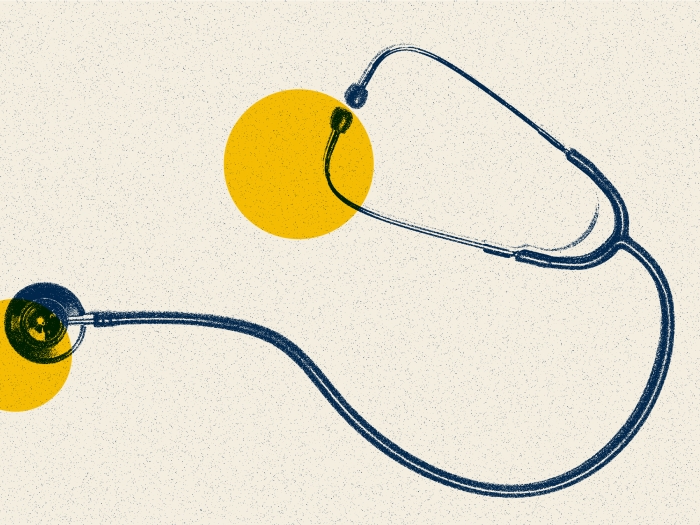Drive-up donation site and online giving effort for Food Gatherers will help address record demand for food and supplies, and support the health of adults and children
Author |
Last spring, when Michigan Medicine needed help gathering protective gear for its front-line staff during the peak of the coronavirus pandemic, the community stepped up, bringing millions of masks, gloves and other items to a drive-up donation site. This helped keep staff safe at the University of Michigan’s hospitals and clinics when normal supply chains were disrupted.
Soon after it started, the drive expanded to include a food and toiletry drive through Food Gatherers, to help address food insecurity and other basic needs in the community.
But those community needs have grown as the pandemic has continued, with record demand for assistance from the organizations that Food Gatherers supplies. Now, Michigan Medicine is launching a second food and toiletry drive for the community, in partnership with Food Gatherers.
The drive will take place between September 8 and 27th and is open to all U-M faculty, staff and students, and members of the community who are in a position to give.
Donors may give online via credit card, or get information about giving by mail or phone, at www.foodgatherers.org/UM.
Or, donors may drive up to drop off food and toiletries at Dock 90 of U-M’s North Campus Research Complex, at 2800 Plymouth Road in Ann Arbor, just off Huron Parkway. Donations can be left between 8 a.m. and 5 p.m. weekdays, and 9 a.m. and 2 p.m. weekends. Volunteers from across Michigan Medicine will be available to help unload donations between 10 a.m. and 2 p.m. weekdays, and 11 a.m. to 2 p.m. weekends.
“The COVID-19 pandemic has led to lost jobs and wages for many in our area, as well as disrupted access to school-based food programs and increased isolation for those at high risk of severe illness from coronavirus,” says Tony Denton, senior vice president and chief operating officer for the U-M Health System. “Thousands of people of all ages in our immediate area now face an unstable food supply and rising food prices, which can affect their health both now and in the future. Together, we can make a measurable difference with compassionate support to those in need of random and intentional acts of kindness.”
More about the growing need for help
Michigan Medicine’s spring food and toiletry drive gathered 26,000 pounds of items for the local community.
But in recent months, as the pandemic’s economic effects began to hit even more people through layoffs, business closures and reduced unemployment benefits, Food Gatherers has experienced a rising demand for supplies from the 170 local organizations it serves.
In fact, the agency distributed more than 2.8 million pounds of food from March through June.
Forty percent of the people seeking help from the agencies that Food Gatherers supports had never sought food assistance before.
In addition, the national organization Feeding America projects that by the end of 2020, overall food insecurity in Washtenaw County will have increased by more than 40% and child food insecurity will have doubled.
One of the agencies that benefits from Food Gatherers is the Ann Arbor Meals on Wheels program, which is part of Michigan Medicine, serving hundreds of older adults with home-delivered meals and supplies. AAMOW buys items at low cost through Food Gatherers.
The donation site will also accept cards, drawings, hand-decorated paper lunch bags and activity books for Meals on Wheels clients.
More about donating:
- Cash donations give Food Gatherers the most flexibility, including buying in bulk at reduced prices. Every dollar donated can buy three meals thanks to the organization’s purchasing strategy.
- Donors should not bring cash or gift cards to the drive-up location.
- For the drop-off donation site, donors are asked to avoid giving items that are perishable (fresh or frozen), expired, already opened or packed in glass.
- Gardeners with extra produce to give may bring it to the Food Gatherers headquarters at 1 Carrot Way, Ann Arbor, Monday through Friday from 9 a.m. to 4:45 p.m. Upon arrival, call (734)-761-2796 to ask for someone to come out for a contactless drop-off.
- PPE for Michigan Medicine is not needed at this time.
Most-needed items:
- Low-sodium hearty soups like beef stew and chili
- Canned fish or chicken, low-sodium
- Canned vegetables, low-sodium or no salt
- Pasta, in cans or packages
- Rice
- Cereal and oatmeal
- Granola bars
- Peanut butter and jelly - plastic jars only
- Toothpaste and toothbrushes
- Soap and shampoo
- Disposable razors
- Nutritional supplement drinks such as Ensure
- Diapers
- Baby food
- Baby formula

Department of Communication at Michigan Medicine





